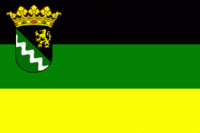Rhineland-Palatinate
| Conventional short name: | |
| Local: | Rheinland-Pfalz |
| English: | Rhineland Palatinate |

| |
| Capitol: | Cologne |
| Languages: | German, Rhenish |
| Organizations: | Holy Roman Empire |
Rheinland-Pfalz or the Rhineland Palatinate is a more recent construction, appearing after the Second Great War. At the time, many thought to split off the Northern Rhineland and join it to Westfalen, however this plan quickly foundered.
The Palatinate can trace its history back to a title bestowed by Emperor Frederick on his half-brother Conrad, who possessed territories on both sides of the Rhine. These lands, which stretched into modern Baden continued in Conrad’s line until it died out in 1214, and passed to the Wittelsbach dynasty of Bavaria.
Eager to increase their holdings, the Wittelsbachs battled and enlarged their lands along the Bohemian border, making the Upper Palatinate. In the 15th and 16th centuries the capitol of the Palatinate was at Heidelberg, and served as the center of the German Renaissance and Reformation.
War lead to destruction and a change of hands for the Palatinate, being transferred from Wittelsbach control at the Peace of Westphalia in 1648. This served only as the beginning of a destructive time for the Rhineland, continuing through to modern time.
In 1720, the capital was transferred to Mannheim, where it remains. Districts of the Palatinate have been added and subtracted over the centuries to produce the Pfalz we know today. During the wars of Napoleon the Palatinate's borders were radically adjusted and given to a Bonaparte.
As for the Rhineland, historically it was divided into hundreds of small territories. By the time of Napoleon II's downfall, the entire region had become a province of Prussia. After the Franco-Prussian War, Prussia annexed the Palatinate as well. These two provinces separated from Prussia and became today's independent republic after the Second Great War.
Today the Rhineland is a large industrial center, supplying the steel needs for much of Europe. It has sovereignty over the Moresnet condominium, which it inherited from Prussia.
| This article is source material
|
Frederic Bayer (
40321):
I would be very much interested in fleshing out the Republic of the Rhineland and the Palatinate. I'm bursting with ideas for its governance, politics, culture and oddities, and I also have an idea for a diachronic conlang. It seems to be a slightly neglected area if the Wiki is any indication.
To start, there is a glaring error I would like to point out: It lists "Mannheim" as the capital, but if that's the same city as the real Mannheim, then it should be in Baden according to the map (and common sense), because it's on the wrong side of that border (the border being the Rhine).
There is in fact a city immediately across the river (i.e. on the correct side) from Mannheim: Ludwigshafen. But personally I would like to propose Cologne as the capital for the Rhineland for a number of reasons: It is nearly the oldest city in the area - Colonia Claudia Ara Agrippinensium (second only to Trier - Augusta Treverorum), as well as, in the real world, the largest city. It is also, arguably, the city most closely associated with the term "Rhineland". Other feasible alternatives would be Coblence and Aachen.
The following is from a discussion on the IB Facebook group:
Frederic Bayer:
Yes, I was thinking that too. I'm new here but I think getting rid of a minor detail from something seemingly abandoned that doesn't affect anything else seems to be fully in line with QSS. As I've pointed out in the Yahoo group, as well, Mannheim cannot be the capital of R-P as it says on the wiki, because as per all of the maps, Mannheim isn't actually *in* R-P. Surely QSS does not apply to things that were done in error/without much forethought?
Jan van Steenbergen:
Aha, let me add one thing more. There's QSS and QSS, or rather, QSS and QAA. In short, that means: provisional info about unclaimed territories deserves a lesser degree of protection than elaborate info written by a caretaker. Which does not mean it should be mercilessly thrown away, but there's definitely some more space for manoeuvering. I'd say, draft a proposal, try to work with the info that's already there, but if something really doesn't fit (or if something is outright wrong), then it can of course be modified.
One such thing that I changed myself once, was the idea that Russia was a buddhist dictatorship. Something that I really couldn't see working. So I invented the SNOR to replace it.
Daniel Hicken:
- Ahem*, it looks like David MacDowell Blue suggested Mannheim.
Frederic Bayer:
As I posted in the Yahoo group, I would suggest replacing it with Cologne
Ben Carnehl:
Wasn't a lot of the old HRR content copied from some older source, anyway?
Jan van Steenbergen:
I was under the impression that much HRR material came from Dan's IB Atlas project from February-March 2004. I just checked it and Mannheim was already there. David joined IB in 2005, I think.
Daniel Hicken:
Interesting. I have no investment in it staying in Mannheim. If anything, I was compiling prior data before me, from the Mists of the Dream Time.
Jan van Steenbergen:
Oh well, if Mannheim was made the capital of R-P in the same period when Russia was put under a Buddhist regime, then I think we can safely move the capital to Köln and Mannheim out of R-P.
| |||
|---|---|---|---|
| Member Entities | |||
| Anhalt | Baden | Bavaria | Bremen | Brunswick | Hamborg | Hannover | Hesse | Lippe | Luebeck | Luxemburg | Mecklenburg | Oldenburg | Premaria | Prussia | Rhineland-Palatinate | Saarland | Saxony | Schleswig-Holstein | Thuringia | Waldeck-Pyrmont | Westphalia | Wuerttemberg | |||
| Colony: Rickerman-Insel |